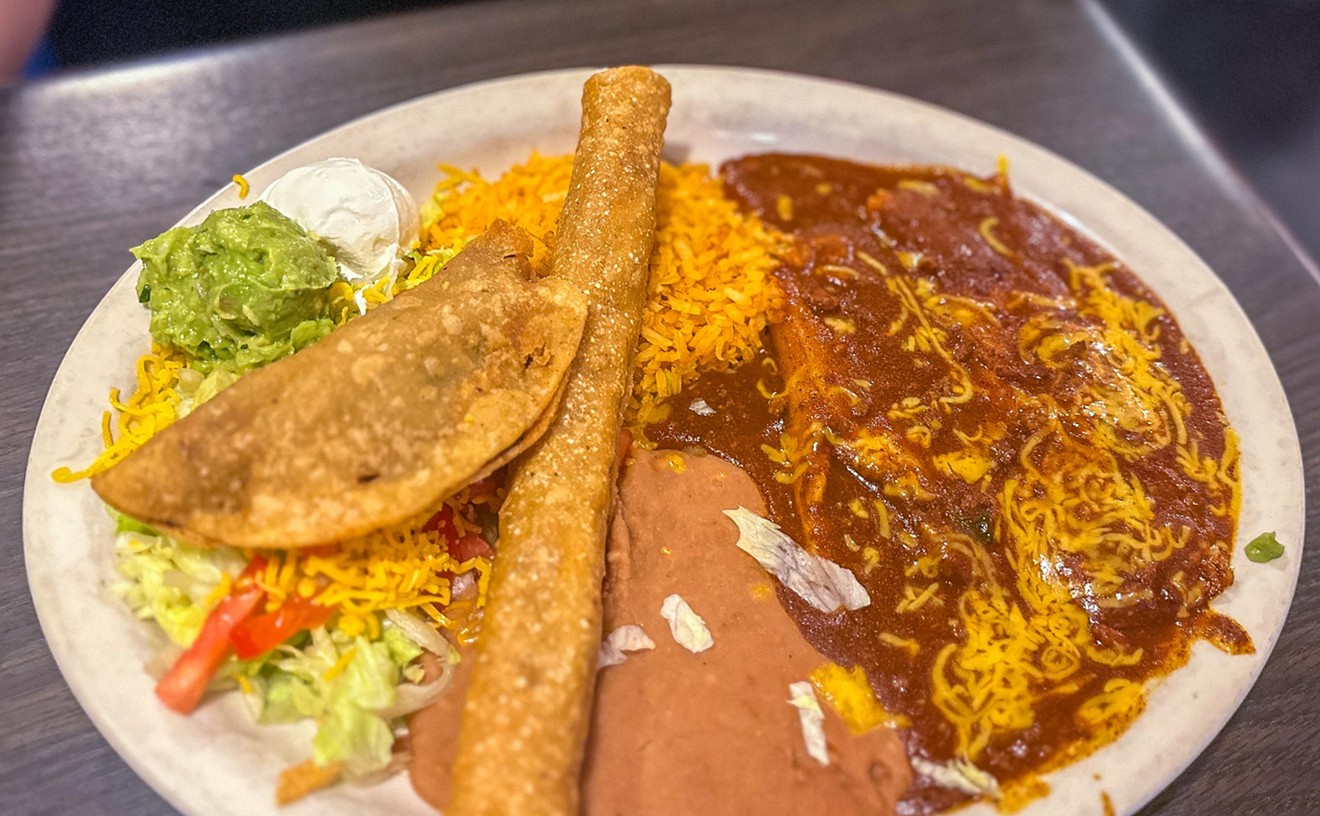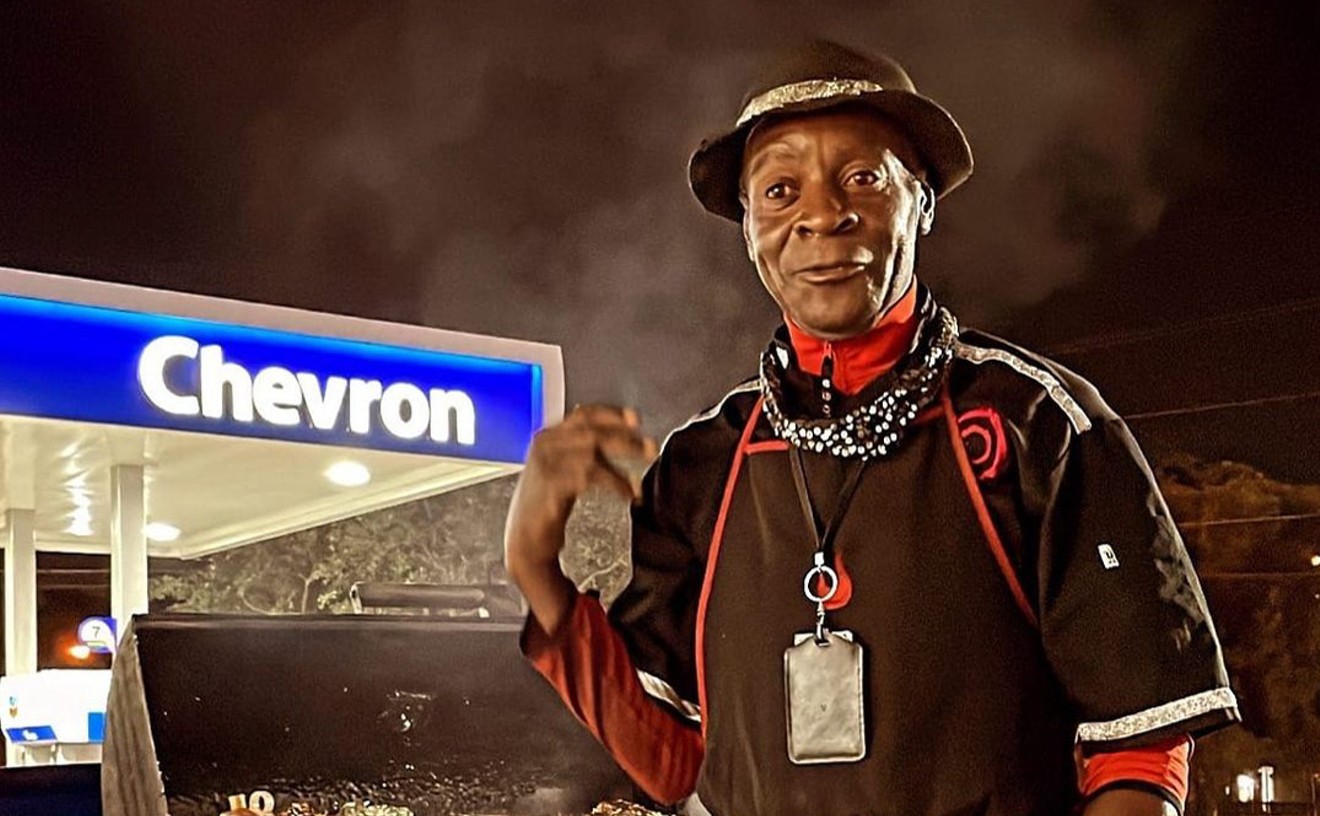It was March 2013 when whispers of a cidery in Bishop Arts first slithered into the ears of thirsty Dallasites. Back then, in the middle of a Kickstarter blaze of glory, owner Joel Malone figured he'd be able to open his fledgling business a couple of months later and start rolling out as many barrels of homemade cider as the locals could drink. The city of Dallas, of course, had other ideas.
Like so many who try to start businesses that don't quite conform to one particular model, Bishop Cider Co. was buried deep, deep in permitting hell, because his business was technically a winery rather than brewery, due to the absence of grain. Over the next year, the bright breeziness of the new and interesting had been replaced by the slow drudgery of bureaucracy that strangles innovation in this city and others. In the end, Malone kept his promise to open in May. But it was May 2014, not 2013.
Recent restaurant reviews: - Urban Acres Farm and Restaurant: This Is What Eating Local in Dallas Should Taste Like - Cold Beer Company Found Out "Local" Is Harder Than It Looks, Especially in Dallas
Operating out of a small building behind Lockhart Smokehouse, near the attractive corner of Bishop Avenue and Davis Street, Bishop Cider is an unassuming little business. The premises look so much like an adorable little townhouse they even have an old-fashioned door knob to turn for those wishing to enter, who will immediately realize how strange that is. Inside, the bar stretches almost the length of the building, which isn't to say much, and houses draft taps and three gleaming canisters of booze being prepared. There are four tables, so the place can only seat 16 people inside, back-to-back on patio-style tables. It's cute, and you couldn't possibly fit enough people inside for there to be a din, so the atmosphere is relaxing for a drinking hole in a fashionable part of the city. Chilled-out music plays. There's homemade Chex mix. The bar staff are knowledgeable and friendly. It really is a lovely spot.
It ain't nothing, though, without its rotating cast of specialist ciders, which are a fascinating bunch. Hailing from England, where several different brands of cider are on draft in every bar, I was more excited than most about the prospect of North Texas getting a specialist cidery. I did feel some trepidation, however, knowing as I do the fledgling and disappointing nature of the American cider market. Brands like Woodchuck sell what is essentially sugary apple juice with a slight alcoholic tinge to those for whom beer is not sweet enough or those who cannot tolerate gluten. In Europe, a cider can range from a palatable session drink to a monster whose ABV sits up there with the strongest craft beers, and it has a complex, dry flavor that is best compared to bitter apples, with little to no hint of sweetness.
Strongbow has started to make its way onto the American market as a "premium" import, but be assured that back home less than a dollar will buy you a 16-ounce can of Strongbow in most shops. It's the Lone Star or PBR of cider -- good in a pinch, but not comparable to a more complex craft brew. A far superior European cider that can be found in America is Sam Smith's Organic Cider, which I've noticed popping up in a few craft beer stores and even Sprouts. Complex, barely fizzy, not at all sweet and packing something of a punch, Sam Smith's cider is a perfect example of how cider can be a viable competitor to craft beer, rather than the drastically different alternative the American market has painted it to be.
Can Bishop Cider make inroads into the local beer market? It's not easy to say so early in the cidery's life, but there are some very encouraging signs. On my visits, the available ciders were Suicider 2.0, Crackberry and Peach Pecobbler. It's fair to say the names could use work, but the ciders themselves are surprisingly good, walking a tightrope of flavor between the European and American extremes by introducing secondary ingredients to mask the dryer tones of the cider base.
Suicider 2.0, a burnt-orange pour with a pleasing lack of carbonation, has a subtle spicing on a mildly sour base that grows on you with every sip. Containing allspice and cinnamon, it's a bit like drinking an apple pie, but with none of the sugar that would make drinking an apple pie so unpleasant. It's the lack of sugar and sweetness that intrigues me about Bishop ciders. They've managed to create a unique product that doesn't really conform to an alcoholic beverage currently on the market, and it's amazing that they've managed to do it while making an endlessly refreshing summer's day drink that you could consume several glasses of without objecting to the flavor. At 6 percent ABV, it works excellently as a cider to sip the day away in Bishop Arts.
The other two ciders currently on pour, at 8.5 percent ABV, are more weighty customers. The dryer sour apple tones are instantly more recognizable in Crackberry, but they're wonderfully balanced by a tart cranberry and just the slightest sweet hint of raspberry, all three of which combine to give the drink an outstandingly complex taste that's both easy drinking and creative enough to give you pause for thought. It in no way feels like an 8.5 percent drink, and as you realize this is a high ABV beverage you can gulp down without a second thought, you might begin to understand why cider has such a large market share throughout Europe.
Finally there's Peach Pecobbler, a peach cider balanced with brown sugar. It's not as dry as Crackberry and thus would be more consistently drinkable, but it shares an ABV with its fruity brother, so don't get too carried away with it. It's sweet, but like the other offerings not overwhelmingly so, and the alcoholic content is so well masked you may as well be drinking slightly carbonated peach juice. It is, again, one of the more interesting things I've drunk.
I would really like to see Bishop Cider produce a classic European cider, though. While the available brews are remarkable in themselves, the business could do with a signature, straightforward, classic cider brew to hang its metaphorical hat on -- a cider we can just call Bishop Cider. The ciders that are available now are fantastic, but I'd love to taste the apple base, stripped of the added ingredients. If the good folks at Bishop Cider could focus on a single, straightforward apple cider, Dallas could have something that no one for hundreds of miles around is even close to -- a quality craft cidery putting out an internationally viable product.
Bishop Cider Co. 509 N. Bishop Ave, Suite C, 214-364-7728. 6 p.m.-midnight Friday, noon-midnight Saturday, noon-6 p.m. Sunday (phone ahead to make sure). $
12-ounce pour, $6 15-ounce flight of three, $8 Homemade Chex mix, $2










